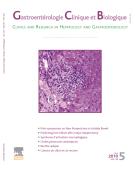Anal incontinence: the role of medical management - 26/03/08
Selma Demirci [1],
Syrine Gallas [1],
Pauline Bertot-Sassigneux [1],
Francis Michot [1],
Philippe Denis [1],
Anne-Marie Leroi [1]
Mostrare le affiliazioniIncontinence anale: place du traitement médical |
Objectifs |
Les recommandations pour la pratique clinique pour l'incontinence anale suggèrent d'envisager en première intention un traitement médical. L'objectif de ce travail était d'évaluer de façon prospective, à partir de 2 populations différentes de malades: 1/la proportion de malades incontinents anaux vus consécutivement dans un centre de soins tertiaires pouvant bénéficier d'un traitement médical de première intention (Etude 1); 2/l'efficacité du traitement médical (Etude 2).
Méthode |
Dans l'étude 1, un algorithme décisionnel standardisé concernant l'incontinence anale a été appliqué chez 287 malades incontinents (209 femmes, 16 à 84 ans) (Etude 1). Dans l'étude 2, 36 malades incontinents avec des troubles du transit associés (28 femmes, limites d'âge 16 à 86 ans), vus consécutivement, ont bénéficié d'un traitement médicamenteux de leurs troubles du transit. Les résultats du traitement médical ont été évalués objectivement et subjectivement après un suivi de 2 mois.
Résultats |
Etude 1: le traitement médical était indiqué chez 126 malades sur 287 (43,9 %) (62 pour diarrhée et 64 pour constipation) alors que le biofeedback était indiqué chez 52 malades (18,1 %) et une chirurgie spécifique de l'incontinence chez 99 malades (34,5 %). Quatre-vingt pour cent des malades à qui on pouvait proposer un traitement médical conservateur étaient adressés par leur gastroentérologue ou généraliste. Etude 2: le score d'incontinence diminuait d'une médiane de 12 à 6,5 (p ≪ 0,001). Soixante et un pour cent des patients se considéraient comme guéris ou améliorés par le traitement médical.
Conclusion |
Le traitement médical peut être proposé en première intention à plus de 50 % des malades incontinents anaux adressés dans un centre tertiaire. Le traitement médical des troubles du transit améliore l'incontinence anale.
Background and aims |
Consensus recommendations suggest that patients with anal incontinence (AI) should be managed by medical treatment when indicated. Our aims were to prospectively evaluate from two different populations of patients: (1) the proportion of incontinent patients referred to a specialized center who were candidates for first line medical treatment (study 1); (2) the results of medical treatment in incontinent patients (study 2).
Methods |
In study 1, standardized management of AI based on an algorithmic decision tree was applied to 287 incontinent patients (209 women, ranging from 16 to 84 years old). In study 2, 36 other incontinent patients with transit disorders (28 women, ranging from 29 to 86 years old) seen consecutively, were treated by a medical treatment of their transit disorders. The result of the medical treatment was objectively and subjectively evaluated after 2 months.
Results |
Study 1: medical treatment was indicated in 126 of 287 patients (43.9%) (62 for diarrhea and 64 for constipation) while biofeedback was indicated in 52 patients (18.1%) and surgery specific for AI in 99 patients (34.5%). Eighty percent of the patients who were proposed conservative medical treatment were referred by their gastroenterologist or their general practitioner. Study 2: the continence score decreased from a median of 12 to 6.5 (P≪0.001). 61% of patients regarded themselves as cured or improved after medical treatment.
Conclusion |
Conservative treatment can be proposed as a first line treatment in more than 50% of patients with anal incontinence referred to a specialized center. Medical treatment for anal incontinence associated with transit disorders improves continence.
Mappa
© 2006 Elsevier Masson SAS. Tous droits réservés.
Vol 30 - N° 8-9
P. 954-960 - Agosto 2006 Ritorno al numeroBenvenuto su EM|consulte, il riferimento dei professionisti della salute.

